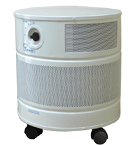- What is HEPA?
HEPA Filters were developed by the Atomic Energy Commission during World War II to remove radio active dust from their plant exhaust. HEPA Filters (HIGH EFFICIENCY PARTICULATE ARRESTANCE) are now the primary filtration systems for electronic clean room assembly, isolation wards, surgical theaters, bioengineering, pharmaceutical processing, and any application where maximum reduction or removal of sub micron particulate is required.
[ Download our "What Is AllerAir Medical Grade HEPA?" brochure - pdf, 65K ] - 99.97% free of particulates
HEPA filtered air is 99.97% free of all particulate down to 0.3 microns (including bacteria, fungal and other opportunistic micro biological). Because of this, HEPA is rapidly coming into many medical applications such as isolation of patients under treatment involving immunological isolation, care for burn victims, orthopedic surgery, etc.| Back | - Interception family
Generally, HEPA Filters belong to the 'interception' family of filters and are variously referred to as 'absolute' super interceptor, and so on. Such filters have a deep bed of randomly positioned micro glass fibers, in which the total bed depth (thickness of media) is very large in comparison to the average fiber diameter and effective pore of free path cross section. - Tortuous path, twist and turns
Even though the media may be only 1/16 " thick, this is an enormous distance compared to the 0.s to 1.0 micron diameter of the fibers. The passages through which air must flow are not straight, but are very tortuous, with many twists and turns. As particulate impact on the fibers and adhere to them, the passages become smaller and the filter increase in efficiency. - Efficiency
The HEPA filter maintains its efficiency over it's two (2) to five (5) years of life. It is 99.97% efficient by particle count down to 0.3 micron, which is 1/75,000 of an inch, or 1/300 the diameter of the human hair. It becomes more efficient both above and below the 0.3 micron particle size.| Back |
- Maintenance
HEPA does not require any cleaning or maintenance to maintain this efficiency. Because all respirable particulate including bacteria, fungi and other minute airborne contaminants are trapped in the HEPA filter, the use of HEPA filtration, when properly applied, will significantly eliminate or reduce the deleterious health effects of airborne contaminants on the respiratory system. | Back | - More efficient
HEPA filtration is 40% more efficient than the highest efficiency rated ASH RAE filter.
| True HEPA Filter Air Purifier Air Cleaner Air Filtration System |



